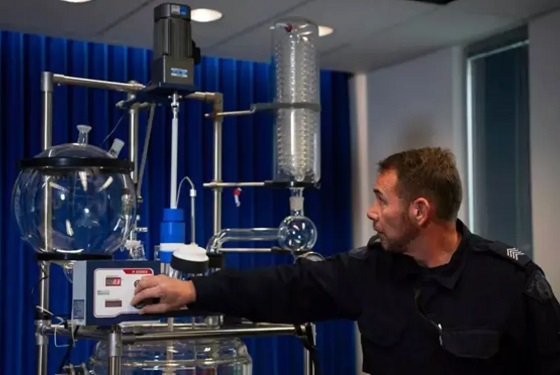Business
Ottawa Funded the China Ferry Deal—Then Pretended to Oppose It

While Beijing-backed hackers infiltrated Canadian telecoms, federal and B.C. leaders quietly financed a billion-dollar shipbuilding deal with a Chinese state firm—then tried to pass the buck.
So just to recap—because this one’s almost too absurd to believe: BC Ferries cuts a billion-dollar deal with a Chinese state-owned shipyard to build four new ferries. Canada’s Deputy Prime Minister Chrystia Freeland—always quick to perform outrage when the cameras are on—writes a stern letter saying how “dismayed” she is. She scolds British Columbia for daring to do business with a hostile foreign regime that’s literally attacking our critical infrastructure in real time.
And then—wait for it—it turns out her own federal government quietly financed the whole thing.
Yes, really.
According to an explosive report from The Globe and Mail, the Canada Infrastructure Bank—a federal Crown corporation—provided $1 billion in low-interest financing for the very same China shipbuilding deal Freeland claimed to oppose. The contract was signed in March 2025. The outrage? That only came later, when the public found out about it in June.

Freeland’s letter to BC’s Transportation Minister was loaded with warnings. She talked about China’s “unjustified tariffs” and “cybersecurity threats.” She demanded assurances that “no federal funding” would support the purchase. But what she didn’t mention—what she conveniently left out—was that Ottawa had already cut the cheque. The financing was already in place. The loan had been approved. Freeland just didn’t say a word.
And when reporters asked for clarification, what did her office say? Nothing. They passed the buck to another minister. The new Infrastructure Minister, Gregor Robertson, now claims the government had “no influence” in the procurement decision. No influence? You loan a billion dollars to a company and have no opinion on where it goes?
Let’s be clear: This wasn’t some harmless miscommunication. If it wasn’t a cover-up, then it was sheer incompetence—the same brand of incompetence that’s driven our shipyards into obsolescence, our economy into dependence, and our country into managed decline. An entire federal cabinet stood by, watched this unfold, signed the cheque—and then pretended they had nothing to do with it.
And British Columbia’s government? Just as bad. Premier David Eby, the man who pretends to champion “BC First,” claims he was “not happy” with the China deal but says it’s “too late” to change course. Too late? This isn’t an asteroid heading for Earth. It’s a contract. And contracts can be rewritten, canceled, renegotiated—if anyone in charge had the political will to stand up and say, “No, we don’t hand billion-dollar infrastructure projects to hostile regimes.”
But instead, we get excuse after excuse. They say BC Ferries is independent. They say there was no capacity in Canada. They say we had no choice. All the while, Canadian shipyards sit idle, unionized workers are frozen out, and the Canadian taxpayer is stuck subsidizing Chinese shipbuilding—and Chinese espionage.
Because while all of this was happening, we now know that a Chinese state-sponsored hacking group called Salt Typhoon was actively breaching Canadian telecommunications networks. That’s not speculation—it’s confirmed in a federal cyber security bulletin dated June 19, 2025.
Chinese actors exploited a vulnerability in Cisco equipment and infiltrated the networks of at least one major Canadian telecom provider. They pulled config files, rerouted traffic through GRE tunnels, and monitored call metadata and SMS communications. Translation: They were spying. On us. On officials. On infrastructure.
So let’s break this down. In February, China hacked Canadian telecoms. In March, Canada quietly finances a massive shipbuilding contract with China. In June, Freeland pretends to be outraged—while hiding the fact that her own government bankrolled it.
And now we’re told, “There’s nothing to see here. No jurisdiction.”
Really?
Freeland has jurisdiction when it comes to issuing carbon taxes, banning handguns, and lecturing citizens about disinformation—but somehow has no jurisdiction when her own Infrastructure Bank gives a billion dollars to build ships in a country that’s attacking our networks and undermining our democracy?
And it gets worse. The interest rate on the loan? Just 1.8%. That’s below market. That’s a subsidy, plain and simple. The financial gap will be recorded as government funding. So even if the Liberals want to play word games about “no direct funding,” that distinction is meaningless. The money came from taxpayers. It went to BC Ferries. It ended up in the hands of the Chinese Communist Party.
So what do we call this? It’s not economic strategy. It’s not climate policy. It’s not forward-looking infrastructure planning.
It’s decline. Managed decline.
It’s a government that tells Canadians we’re too broke, too slow, too divided to build our own ships. So we’ll just outsource it. To the same regime our intelligence services say is spying on us and interfering in our elections.
This was a test. A big one. And the people who told you they were going to put “Canada First”—people like David Eby and Mark Carney—failed that test spectacularly. When it came time to make a real choice—stand with Canadian workers, Canadian industry, and Canadian sovereignty—or cave to foreign pressure and cheap outsourcing, they chose China.
And then they lied about it.
But Canadians aren’t stupid. We know what leadership looks like—and this isn’t it. We don’t need more slogans. We need action. We need courage. We need people in government who actually believe in this country and the people who built it.
Because Canada can build ships. Canada can defend its infrastructure. And Canada should never hand over critical national projects to a regime that’s actively working against our interests.
If this is what “Canada First” looks like under the Liberals and the BC NDP, then we need something better. It’s time to stop managing decline and start building again.
Call the election. Let Canadians choose a path forward—one rooted in strength, in sovereignty, and in pride. Let us choose leaders who put Canada first—for real.
Subscribe to The Opposition with Dan Knight
Business
Democracy Watch Drops a Bomb on Parliament Hill

This is the Laurentian elite in action, the real swamp. And let’s stop pretending it’s a misunderstanding. It’s not. It’s a design. And it’s been rigged from day one to shield the powerful and confuse the public.
It was supposed to be a routine ethics committee meeting — another step in Parliament’s long, quiet review of the federal Conflict of Interest Act. Instead, it turned into a full-blown headache for the Liberal government.
Earlier this week, the Standing Committee on Access to Information, Privacy and Ethics (ETHI) called a single witness for its first hour: Duff Conacher, co-founder of Democracy Watch and longtime government ethics critic. That alone set tempers flaring. Liberal MPs objected to Conacher getting an entire hour to himself, arguing the time could have been shared with “other experts.” In reality, those “other experts” were expected to deliver much friendlier testimony for the government, academics who tend to describe Canada’s ethics rules as needing “tweaks,” not a total overhaul.
Conacher, by contrast, didn’t mince words. His opening statement hit Ottawa like a hammer. He called the federal Conflict of Interest Act a “sad joke,” saying it fails to regulate the people it’s supposed to, the Prime Minister, Cabinet ministers, and senior officials. Conflicts of interest, he said, aren’t occasional or accidental; they’re baked into how Ottawa works, and the law “neither prevents nor penalizes them in any meaningful way.”
He detailed how the system’s supposed safeguards actually work as escape hatches. The two big culprits: “ethics screens” and “blind trusts.” Ethics screens, he said, are an administrative fiction created and managed inside government to hide, not prevent, conflicts. Officials can quietly “step aside” from files without the public ever knowing, and sometimes don’t step aside at all.
Blind trusts, Conacher said, are not truly blind. Office-holders know exactly what assets they’ve placed there, can receive updates from trustees, and in many cases keep key holdings outside the trust entirely.
He told MPs this setup becomes most absurd at the very top, the Prime Minister’s Office. Cabinet-level decisions are routinely labeled as being of “general application” (affecting everyone), which means they’re automatically exempt from the Act’s restrictions, even when they clearly have direct financial consequences for the officeholder. “The higher you go,” Conacher said, “the easier it is to claim you’re exempt.”
He then pushed for real transparency, public logs showing who officials meet with, what files they handle, and when they actually recuse themselves. If that data were made public, Conacher said, Canadians would discover that even when officials have financial conflicts, they still participate in government decisions “the vast majority of the time.”
Finally, he outlined what a functional ethics regime would look like:
- Close the “general application” loophole.
- Make ethics screens public and detailed.
- Scrap blind trusts for top roles and require divestment (with tax fairness for those who sell assets to serve).
- Impose real penalties and enforcement… not polite advice after the fact.
Conacher ended by telling the committee it’s time for action, not handwringing. “Culture follows rules with teeth,” he said, urging MPs to draw bright lines, demand disclosure, and prevent conflicts before they happen, not sweep them under the rug afterward.
Under Oath and Under Fire: MPs Probe Carney’s Conflicts and the Cracks in Canada’s Ethics Law
If Duff Conacher’s opening statement rattled Ottawa’s cage, what came next set it ablaze. Conservative MP Michael Cooper used his time to zero in on the biggest political live wire in the room, Prime Minister Mark Carney’s personal financial interests.
Cooper began by asking the question that should make any ethics commissioner nervous: what exactly is the Prime Minister invested in? He pointed out that Carney still holds “carried interest,” a performance-based bonus, tied to the Brookfield Global Transition funds he helped raise before entering politics. These are not simple mutual funds. They’re massive, complex investment vehicles owning stakes in energy, infrastructure, and transition projects across the world. The problem? The public has no idea what specific companies those funds contain. Cooper’s point was simple: if Canadians don’t know where the Prime Minister’s money is, how can they know when he’s in a conflict?
Conacher agreed. The current disclosure rules, he said, allow secret investments. The public can’t see the holdings, but the PM still can. “He knows what industries and companies are affected by his own policy decisions,” Conacher testified. “That’s the problem.”
Cooper then moved to what’s quickly becoming the most infamous phrase in Ottawa ethics law: the “general application” loophole. It’s the technical excuse that lets Cabinet ministers, and especially the Prime Minister, participate in decisions that could benefit their financial interests so long as those decisions can be described as affecting everyone. Conacher didn’t hold back: “The Act only applies one percent of the time,” he said flatly. “A real conflict is almost impossible under the way it’s written.”
Cooper shot back that nothing stops Carney from voluntarily disclosing more. Conacher agreed “he could,” he said but made clear that the PM has chosen not to.
That’s when Cooper went for the jugular: how can an ethics screen even work if the holdings that trigger the conflict are secret? Conacher didn’t flinch. He called the PM’s ethics screen a “smokescreen” — something that hides more than it reveals. He added that the screen even violates the Act’s own rule on disclosing recusals, since it keeps the public completely in the dark about when, or if, the PM steps aside. In practice, Conacher said, because of that same general-application carve-out, “the Prime Minister is participating 99 percent of the time in decisions affecting his interests.”
Cooper then questioned the screen’s independence, pointing out it’s administered by the Prime Minister’s Chief of Staff and the Clerk of the Privy Council — both appointed by Carney himself. Conacher’s reply cut to the bone: “Anyone who serves at your pleasure is not independent.” He reminded MPs that the entire screen system wasn’t even created by law — it was invented by the Ethics Commissioner. He said the Commissioner could make it fully transparent tomorrow by simply publishing every recusal in real time, which would expose how rarely the PM is actually stepping aside.
Finally, Cooper dismantled the “blind trust” talking point — the standard line every prime minister uses to claim their finances are sealed off from politics. “Blind trusts are not blind at all,” Conacher replied. “You choose your own trustee. You can give instructions. You can get updates. And you already know what you put in.”
Then came the bombshell. For Carney, Conacher said, some Brookfield holdings — the so-called ‘103 companies’ — sit outside the trust altogether. On top of that, Carney holds stock options that don’t expire until 2033. “He knows he’s in a financial conflict,” Conacher said.
By the time Cooper’s five minutes were up, the Liberal MPs across the table looked like they wanted to be anywhere else. The record now showed that the Prime Minister of Canada — a former global banker — still has multimillion-dollar ties to one of the biggest investment firms in the world. And under the current rules, he can claim it’s all perfectly legal.
Once Conservative MP Michael Cooper wrapped up his blistering cross-examination, the rest of the Ethics Committee meeting turned into something resembling a slow-motion car crash for the Liberals. Every new round of questioning circled back to the same uncomfortable truth Duff Conacher had already laid bare: the Prime Minister’s conflict-of-interest system is broken by design and everyone in Ottawa knows it.
Liberal MP Mark Leslie Church tried to change the subject by turning the discussion into a technical one. He asked Conacher why Canada has two separate ethics regimes the Conflict of Interest Act for cabinet and staff, and the Members’ Code for MPs and whether that structure makes sense. Conacher calmly explained that while other jurisdictions merge the two, the real issue isn’t structure, it’s substance. He pointed out that the Prime Minister also operates under a separate PM’s code — one that, on paper, bans even apparent conflicts of interest and has no “general application” loophole. But that code, he noted, hasn’t been re-enacted by Mark Carney. The version still online is from 2015, signed by Justin Trudeau. “Prime ministers,” Conacher said pointedly, “have not been enforcing their own rules.”
Church then tried a softer tack, quoting the Act’s preamble, the part about “encouraging experienced and competent persons to serve in government.” He suggested that Conacher’s strict divestment rules might discourage talented people from entering public life. Conacher’s reply was direct: “The purpose of this Act is to prevent conflicts of interest, not accommodate them.” If divestment made service costly, he said, the law could offer tax-neutral relief so people could cash out without penalty. The goal wasn’t to keep the rich out — it was to keep the law clean.
Then came Bloc Québécois MP Luc Thériault, who cut through the procedural language and went straight for principle. “We are here to bring ethics into politics,” he said in French, “not politics into ethics.” He agreed that the current regime is designed to tolerate conflict rather than eliminate it. Conacher concurred and said flatly that screens and trusts are gimmicks. The only real solution, he said, is divestment , sell the assets, remove the conflict, period. He pressed for full transparency on recusals, saying Canadians deserve to see when and how the Prime Minister actually steps aside.
When Thériault got another turn later in the session, he hammered the same point: how can a recusal be independent if the PM’s own Chief of Staff and Clerk are the ones running the screen? Conacher said it can’t be. Even if the PM does step back, “everyone knows what his interests are,” and those subordinates “serve at his pleasure.” He added he was surprised Carney didn’t cash out before taking office, noting that by keeping his holdings, the PM guaranteed himself a steady stream of ethics questions, a “constant drag on credibility.”
Next up was Conservative MP Gabriel Hardy, who didn’t waste time with hypotheticals. He asked point-blank whether the Prime Minister is in a financial conflict “pretty much any time” he makes a decision that affects Canadian businesses. “Yes,” Conacher replied without hesitation. Hardy then tore into the Ethics Commissioner’s leniency, noting the maximum penalty under the Act — a laughable $3,000 fine — and suggesting it’s meaningless for office-holders making hundreds of thousands of dollars a year. Conacher agreed, saying even parking laws are enforced more strictly than the rules meant to keep the Prime Minister honest. Hardy floated the idea of disgorgement — forcing officials to repay any financial gains from conflicts — and Conacher backed it, saying the Act needs penalties “with real bite.”
When Liberal MP Abdelhaw Sori took over, he tried to salvage the conversation by going academic. Could the law ever really eliminate the appearance of a conflict? Conacher said yes B.C. does it already by using a reasonable-person test to define “apparent conflict.” Sori then asked how to fix the notorious “general application” clause. Conacher’s answer: draw a hard legal line. If you have any financial interest in a decision, you don’t participate — period. The only exceptions would be for truly universal measures (like income tax changes that affect everyone equally). For those with complex assets, he reiterated: require divestment but make it tax-neutral, so people can serve without financial punishment.
Finally, Conservative MP Shuvaloy Majumdar brought the discussion full circle, back to the heart of the matter: what the Prime Minister actually knows. Majumdar walked Conacher through the so-called “blind trust.” Carney knows exactly what went in, he said, and those holdings rarely change. Conacher confirmed that even the Ethics Commissioner has admitted most trustees don’t move assets much. Majumdar noted that Carney helped raise billions in Brookfield’s funds and likely holds millions in exposure himself. Conacher agreed, adding the PM still has stock options that run until 2033, as well as a carried interest bonus tied to fund performance.
Majumdar then brought up the optics: the Prime Minister had just returned from a New York trip meeting with global investment managers, many linked to those same funds. “That’s a pretty precarious conflict,” he said. Conacher agreed, saying Canada’s system allows “major conflicts at the top levels of government” to persist under a veneer of compliance. Full disclosure would help, he said, but transparency is not a cure. “It shows the conflict,” Conacher said, “it doesn’t remove it.”
By the time the first hour was over, the damage was done. Conacher had made his case: the Conflict of Interest Act doesn’t just fail, it protects the powerful. And under it, Canada’s Prime Minister can hold multimillion-dollar stakes in a global investment firm, meet with its partners, steer economic policy, and still claim everything is perfectly ethical.
Final thoughts
So let’s just be blunt here. If you’re watching this committee and you’re not angry, you’re either on the Liberal payroll or asleep. The Conflict of Interest Act is a glorified PR stunt, and the ETHI committee just confirmed it. They brought in Duff Conacher one of the few people in Ottawa who isn’t trying to polish the furniture on the Titanic and what did the Liberals do? They squirmed. They griped. They pouted about how unfair it was that a watchdog was actually allowed to talk for more than five minutes.
Meanwhile, Mark Carney, the former global banker, is sitting on long-term stock options, carried interest, and investment ties that stretch around the world. And under this Swiss cheese ethics law, he can regulate industries he’s invested in, meet with their CEOs, shape policies that affect their bottom line and still say he’s “compliant.”
You couldn’t design a more self-serving system if you tried. It’s like asking the fox to recuse himself from guarding the henhouse and then letting him write the rules for the next guy.
And here’s the part that should make your blood boil: every one of these so-called public servants will walk away from Parliament one day with a gold-plated pension, a Rolodex of lobbyists, and a guaranteed seat on some corporate board that will pay them handsomely for doing one thing, being connected. That’s what this system rewards: not service, not honesty — but access.
You think Mark Carney’s going to struggle to find work after this? Please. Every global bank, hedge fund, and foreign multinational will be begging him to sit on their board so they can tap into Ottawa’s inner circle. He’ll cash out, smile for the cameras, and call it “public-private partnership.”
This is the Laurentian elite in action, the real swamp. And let’s stop pretending it’s a misunderstanding. It’s not. It’s a design. And it’s been rigged from day one to shield the powerful and confuse the public.
So no, the ETHI hearing wasn’t just another bureaucratic exercise. It was a window into how power actually protects itself in this country. And unless Canadians get loud, unless they demand actual penalties, mandatory divestment, real transparency, this isn’t going to stop.
It’ll just keep getting worse.
Business
Jobs Critic says NDP government lied to British Columbians and sold out Canadian workers in billion dollar Chinese ferries purchase

Harman Bhangu, BC Conservatives’ Critic for Jobs & Economic Development, says the leaked Seaspan report proves the NDP hid the truth about BC’s shipbuilding capacity.
On July 15, BC Conservative MLA Harman Bhangu, Opposition Critic for Transportation, warned that the BC Ferries deal with China was more than a bad contract — it was a betrayal. He said local shipyards were capable of building those vessels right here in British Columbia, and that the NDP government was selling out BC workers.
Now, the leaked Seaspan report proves he was right.
“Turns out everything I said back in July was true,” Bhangu posted on X. “The leaked Seaspan report confirms we could have built our own ferries right here at home, creating thousands of good-paying jobs for tradespeople, suppliers, and local businesses. More importantly, it would have injected billions into BC’s economy and helped rebuild our shipbuilding industry for the next generation. The NDP ignored the report, lied to workers, and lied to British Columbians. They knew the truth, buried it, and sold out BC workers anyway. That says everything.”
The report, quietly commissioned by Seaspan in 2023 and shared with government officials months before BC Ferries signed with China Merchants Industry (Weihai), outlines exactly what could have been done at home. It details how British Columbia had the capacity, the workforce, and the industrial base to build the four hybrid vessels locally. By doing so, it estimates, the province could have supported nearly 10,000 jobs, generated over $1.1 billion in local economic activity, and brought in $234 million in provincial tax revenue. Instead, those billions are now headed offshore to a Chinese state-owned yard.
Bhangu told The Opposition what he learned firsthand from shipbuilders long before the leak:
“Back in July, I visited Seaspan and spoke with people directly involved in shipbuilding here in BC. They told me that in 2021, under John Horgan, there was a shipbuilding strategy that laid out a roadmap for building vessels right here in the province, not just repairing or servicing them. But when David Eby took over, that plan was effectively buried. The focus was quietly shifted from shipbuilding to a ‘parts and repairs’ model, which meant the real economic opportunity actually constructing ships here was lost. The report that’s come out confirms exactly what I was told: BC yards could compete, they wanted to compete, and they were capable of doing the work. The only thing standing in their way was a procurement process that was rigged against them from the start.”
That’s the heart of the scandal: the NDP and the Canada Infrastructure Bank used $1 billion in taxpayer financing to bankroll Beijing’s shipbuilding industry while telling British Columbians their own yards “lacked capacity.” They didn’t. The leaked document shows the government knew it… and buried it anyway.
Bhangu isn’t mincing words. He says this isn’t just about ferries; it’s about sovereignty. “We’ve exported jobs, tax revenue, and security to a foreign power,” he said. “And the government did it knowingly.”
The Political Fallout
Premier David Eby and the BC NDP maintain that local shipyards “lacked capacity” to deliver the four new hybrid ferries on time and on budget. But the leaked report contradicts that defense.
Bhangu and other Conservative MLAs are now calling for the full document to be made public and for an independent inquiry into how the decision was made.
As Bhangu put it, “This isn’t just about ferries — it’s about sovereignty, jobs, and honesty. The government buried the truth because it didn’t fit their narrative.”
So what do we have here? A government that knew the truth, hid the evidence, and handed over a billion taxpayer dollars to a foreign state-owned yard while pretending BC couldn’t do the job. They buried a plan that would have put thousands of our tradesmen to work and pumped billions into our own economy because the optics of standing up for BC were too inconvenient. That isn’t leadership. And if this province still means anything to the people running it, someone in Victoria should have to answer for that.
Invite your friends and earn rewards
-

 Artificial Intelligence22 hours ago
Artificial Intelligence22 hours agoThe App That Pays You to Give Away Your Voice
-

 Health23 hours ago
Health23 hours agoThe Religious Faith in Vaccines has been Challenged, Forcing New Studies and More Rigorous Standards
-

 Business2 days ago
Business2 days agoUK Government Dismisses Public Outcry, Pushes Ahead with Controversial Digital ID Plan
-

 Crime2 days ago
Crime2 days agoThe “Strong Borders Act,” Misses the Mark — Only Deep Legal Reforms Will Confront Canada’s Fentanyl Networks
-

 COVID-192 days ago
COVID-192 days agoBiden admin put ‘anti-maskers’ on TSA no-fly list normally reserved for terrorists
-

 Business2 days ago
Business2 days agoCarney government refuses to make tough decisions to avoid larger deficit
-

 Censorship Industrial Complex2 days ago
Censorship Industrial Complex2 days agoBill C-9 and the Tyranny of Feeling Heading Straight for Canadians
-

 Red Deer2 days ago
Red Deer2 days agoThe City or Red Deer Financial Troubles: The Role of Good Governance, Effective Policies and Key Performance Metrics.












